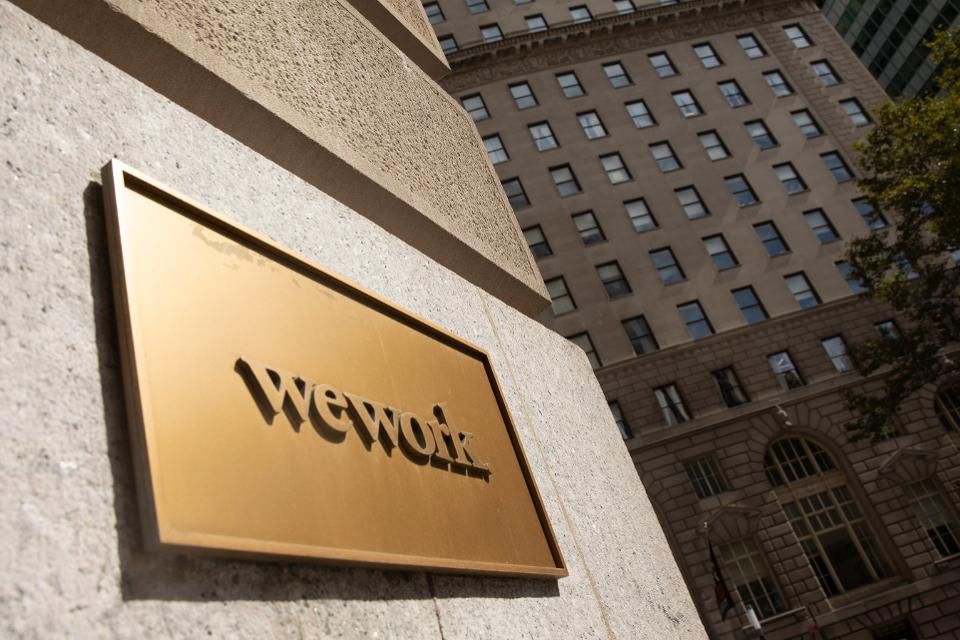
![A WeWork sign hangs on a building, Monday, Sept. 30, 2019, in New York. WeWork says it is... [+] withdrawing its initial public offering less than a week after its controversial CEO stepped aside from the troubled company. (AP Photo/Mark Lennihan)](https://thumbor.forbes.com/thumbor/960x0/https%3A%2F%2Fspecials-images.forbesimg.com%2Fdam%2Fimageserve%2Ff056bf97f88440e0b10ebd6bf5d743f1%2F960x0.jpg%3Ffit%3Dscale)
WeWork’s unsuccessful IPO attempt has generated a lot of media attention over the last two months. In Forbes, we ran a comparison of the disclosed related party transactions versus recent high profile IPOs. Our head of research was interviewed extensively at IPO Edge regarding the governance, valuation and business model considerations surrounding the offering. The same outlet also wrote about the disappearing references to cash flow in the amended S-1 filings with the SEC.
While the dust has not settled yet (the company is going through a radical overhaul, with the founder/CEO stepping down, the staff members closest to him on their way out, and a curtailment of new leasing activity), we decided to take a look at what has been said about WeWork on conference calls by publicly traded players in the real estate industry.
We went through 300 (yes, 300) transcripts of global real estate companies going back two years, with our search being mentions of WeWork, co-working, or coworking. The industry comments overall are mixed: while all acknowledge the rapid growth of co-working, some seem happy to partner with WeWork and many of the other providers, others are rolling out their own versions of the product, and some players have been expressly skeptical on the model, both in terms of its durability through the cycle, and regarding coworking as a defacto direct competitor. We will highlight several of these comments chronologically, emphases ours.
Empire State Realty Trust (NYSE: ESRT), a Manhattan-focused entity, has been perhaps the most consistent skeptic. In November 2017, the company said this about WeWork (and its tenants): “On WeWork, and I’ll just — maybe, John will join me here as well. But look, we’ve commented before that — we said in the past, we will not lease space to WeWork. Not only do we prefer the direct relationships with the end users of our space but in our view, WeWork’s model makes it difficult, if not impossible, to have a secure building, and their transient users tend to beat up on the buildings. We don’t think we should underwrite the risk of their variety of short-term rental income streams when we have great tenants to whom we can lease directly.”
Workspace Group PLC out of London in June 2018 were also skeptical: “I think some of the co-working, to use your expression, some of these kind of quick startup reactionary businesses, it will be interesting to see how long they last.
ESRT again in September 2018: “I think, from our perspective, we don’t have WeWork as a tenant in our portfolio. Our view, as Tony has articulated, is we don’t like the proposition of providing a long-term lease to someone who’s, in turn, entering into short-term agreements. And then, we generally not, very often, not creditworthy entities, not that the enterprise business is different. But we don’t see it as a good credit.
Paramount Group (NYSE: PGRE) operates in NYC, SF and Washington, DC (top WeWork markets). They have also been consistently skeptical. This quote is from the Merrill Lynch Real Estate Conference in September 2018: “We have been focusing on the leasing side on long-term, financially-stable companies. That — we haven’t been focusing on co-working activities. We have not taken the easy way or the easy route of filling up our space while it was vacant. With co-working space, which would have been very easy to do. We wanted long-term stable with growth for the next couple of years future tenancy for our portfolio. And I’ve seen it before, after the bubble burst in the last tech crisis. The predecessor had a 98% leased portfolio and in the 2 years after, where the whole market was screaming about how bad it was, our portfolio was stable. The cash flow was coming in and that’s a very comforting situation when the market gets difficult. Today, nobody thinks about it and we might be filling the gap between 98% leased and 99% or so with some of the co-working opportunities, as an amenity to our tenants or for our tenants, but we want to build a very stable platform. And we are confident that if the market gets a little rougher that investors realize that some companies are different than others.”
Ichigo Inc. from Tokyo, in October 2018, invokes the famous “bubble” saying: you can look stupid now, missing out on the hot thing, or, you can look stupid later, having a big loss: “The one thing to be very clear that we are not doing and will not do, and to that extent, we are not WeWork. We care about cash earnings. Every single corner — quarter making money. You will not ever get Ichigo to bet the ranch, we’re going to lose $5 billion, but potentially we’re going to be worth 50 billion. And so that is our fundamental problem with the business model is that we’re not willing to do massive upfront spend with a — with what we think of potential unknown payout. And that possibly makes us a less interesting investment, and I fully recognize, because our basic position, as everyone else is smart and we’re stupid. And so we are very involved and we study these other business models, but that has been the main reason why we’re not participants because none of these are breakeven businesses. They are significant loss creators since, potentially, the fact loss they did when they turn into significant revenue generators over time, but that’s the reason we have chosen not to enter this space, in this sort of gateway.”
ESRT again in November 2018 openly criticized what they saw as giveaways: “I think that focusing in on WeWork perhaps understates the — what’s going on when you’ve got WeWork, Industrious, Serendipity, Knotel, Convene. The New York City market, the shared office environment is without question, and has for some time been the single largest tenant. And we just don’t understand why landlords don’t pay attention to what is motivating people to go to these different user of space, who then turn around and relet it to others. We think that it’s important for landlords to recognize that in New York City alone landlords have probably invested over 3/4 of $1 billion in shared office space providers in the form of tenant installation free rent commissions. And I think it’s just a very easy things for people to do, and we don’t see a reason to do it.”
Alstria Office REIT, out of Hamburg, in November 2018 was point plank: target is zero exposure: “So to your first question, our target exposure to co-working space, et cetera, is actually 0.”
ESRT was critical again in February 2019, shining the spotlight on the competitive aspect of the coworking model and issued a warning to the industry: ”Three, we have no exposure to the new wave of coworking enterprise office providers. I have been very clear for years and the world now recognizes that these companies seek to disrupt the relationships amongst tenants, landlords and brokers with outsized risk from weak equity-dependent business models. I maintain that landlords, investors and lenders will regret the day, they decreased the probability of their future cash flows with the leases they have made with these tenants.”
On the same call, ESRT went further, calling the model weak and a “shiny penny”, criticized consultants’ projections, and said the co-working golden age is over: “Look, I would not be surprised to see other major players other than the CBRE begin to offer this up. I think it’s the bright shiny penny and the fact is if I thought it were a good business with which we should engage, we’d lease to them. I don’t. Thing is disruptive on the one hand. And on the other hand, I think that their models are weak. Their business models are weak. So we’re watching it. Again, we see no need. We had no need. We’ve demonstrated terrific results without going into this category of tenant as — in our portfolio. And I read the summaries of the consultants’ reports on what they think about the future for shared office space and enterprise-leasing models are and I think that it’s unusual to go to some of these firms economist for true economic advice, anybody can put together a straight line graph. I think under some of the statistics, which have been embedded about even on the calls which you guys have hosted on this matter. The 7 years from now, 135% of all office space will be handled by co-working and other enterprise office providers. And I just don’t think that’s going to happen. I think it’s seen its bright spot, and I think that it’s dimming. Not going away, but I don’t see the big expansion. Either way, we don’t have to expose ourselves and our stakeholders to it.”
Derwent London PLC in February 2019 discussed reduced per-building exposure: “We’re always quite choosy how we let our buildings, and we’ve decided that we’d rather have them in part of a building as complementary to the office occupiers of the buildings, a bit going back to what I said about core and flex.”
Kilroy Realty Corp (NYSE: KRC) at the Citi Global Property Conference in March 2019 describes the issues around the credit risk of having a SPE as a tenant: “We haven’t needed to go that way. I think co-working is a wonderful thing, and we have probably across the platform a couple hundred thousand square feet, I guess. And so we have a little bit of it. And I think there is a place for that. I am — I really don’t want — I want to be in control as much as we can of our destiny. And if you let – do a big lease for the co-working space, you’re paying for the tenant improvements. They’re marking it up. And they’re leasing space to — sometimes your own clients. There is a credit issue. And — let’s just say that we’re not going to go big in co-working, okay? We’ll have a little bit here and there.. .So I don’t like the idea of a lot of this stuff, and I’m not going to speak about any particular companies, but they tend to come in. They have a special-purpose entity, that’s your tenant. You always have to ask if something happens, what leverage do they have on you? I don’t want to be in that position”
PGRE, mentioned above already, at the same conference in March 2019 says that the model is not proved in a recession: “To the general marketplace, I want to say that our perspective on co-working has been very selective. We have not done a single deal with any co-working because it’s a fundamental belief that, that type of a model is not proven in a recession. So I think notwithstanding that, it might not have an impact to our business per se, it could have a impact to the marketplace.”
Further in the same transcript, we get reminded of Regus “ We think that the co-working model is clearly not proven in a recession. It has become popular after 2010, especially with the growth of WeWork. We have been very skeptical from the get-go. And because of our long-term experiences in this market, we have seen how similar models in previous cycles have worked out to be difficult. One of the similar models is Regus, and some of you might be familiar with that exit there during a recession. So this model hasn’t been proven in a normal recession, and that’s why we want to focus on credit tenants. And we have been focusing on that in our re-leasing efforts, and we are very proud of it. So we want to be ready in case of a downturn with a portfolio that is really long-term leased with growth, embedded growth, and avoiding less credit-worthy tenants in the portfolio.”
Boston Properties (NYSE: BXP) at the same conference in March 2019 describes how volatile the model is: “But there’s a volatility issue that’s associated with the business. So the larger the enterprise business becomes and the more space that is leased on a short-term basis to the extent there is a downturn, if you talk to WeWork, you’ll get a different answer, but our view is that, that’s likely to be the space that is probably disposed of by companies who are looking to cut costs. And so therefore, you have sort of a double-edged risk. In a normal situation, we do a lease with Citibank. They decide they’re going to downsize and they sublet space, but we saw Citibank on the lease. We have WeWork or we have an industrious or yard or a Cambridge Innovation Center or an office by Regus, spaces by Regus center in our portfolio and the major enterprise tenant leaves, they have a conversation they’re going to have with the landlord about whether or not they should “get a different rental stream” because they “make shut down that branch,” right, that’s the conversation that you worry about having occurring. And the security behind that is not 15 years of Citibank credit, it’s an LC or a guarantee that’s probably at a maximum 2 years and probably at this point is burned down into a year or 8 months or something like that.”
Like BXP, Equity Commonwealth (NYSE: EQC) at the same March 2019 conference went into great detail about their concerns, and how they see a demand contraction playing out: “We look to reduce capital where we can and we don’t take credit risk from co-working firms that have no credit. …The mismatch between the liability from a lease perspective for the co-working tenant, the actual co-working company and its tenants, I think, is an additional risk. They have an obligation to you as a landlord — sorry, David, they have an obligation to you as a landlord that’s longer than their customers have to them. And they’ve isolated themselves intelligently from a liability perspective so that they don’t have parent guarantees on the leases. And I think if there’s a downturn, we’re going to see a giveback of space that will be unlike what we’d seen in the past…There’s got to be a downturn, we just don’t know when it’s going to be. And what’s going to happen is WeWork is going to take its 8 locations and they’re going to consolidate those people under the 3 tenants — 3 landlords, then make a deal with them to recut their lease at a market rate that they can afford. They’re going to say to the other landlords, “I can’t pay your rent because I have no one paying me rent.” And the landlord is, if history is any guide, going to say, “Well, I don’t have anyone else for that space, so do what you can and we’ll share.” It’s a wrong way bet for a landlord, that’s for sure. What’s it — the root if it is, is that businesses want, at least at the margin when times are good and they’re taking incremental space, they want flexibility. But you can be sure that when things slow down and the real estate guy gets a call from the CFO and the CFO says we need to reduce our footprint by 10% and he has a choice to give back his 9-year remaining lease term with us or his 9-month remaining lease term with WeWork, I can assure he’s going to give back the WeWork space.”
Mapletree Commercial Trust (traded in Singapore) call in April 2019 express skepticism about the multitude of players in the space: “We are not going to go for any coworking space operator, maybe a select one or few. We are likely to spread. One is — I don’t want to have coworking operators, 2 or 3 in one building. The other thing is I need to make my best. It’s a moving industry or should I say, a sector in recent times for the singular market. How many can last? How many has the staying power? How many has the longevity? We have to take a bet.”
EQC (the long-ish segment just above) on their quarterly call in April 2019 gave some metrics about the current size of coworking demand, and how they are working to mitigate their exposures: “Turning to office fundamentals. In the first quarter, roughly 15 million square feet of new supply was added to existing inventory across the U.S. with positive net absorption, pushing the vacancy rate down 50 basis points year-over-year to 12.5%. National vacancy is the lowest it’s been since 2007 and lower by 430 basis points versus peak vacancy in 2010. I would add one footnote to that vacancy number. We see a lack of breadth in demand for office space. In 2018 alone, co-working operators accounted for more than 50% of net absorption. The vast amount of space leased to co-working operators in the past few years is not at the same nature or tenor as traditional tenants. Shared office operators are meeting marginal demand, and their customers are paying a premium for flexibility. When the cycle turns, likely they will return that supply to the market. We’re addressing this risk by limiting our exposure to riskier credits while also competing for high-quality tenants by operating upgraded building amenities…”
On the same call, EQC spelled out the prior outcomes of coworking booms, and reiterated that they see coworking space losing tenants first: “But our experience has been this is the third iteration of the co-working. The first 2 did not end well certainly for landlords. They are such a factor in the market, and there’s really a couple of issues you need to consider. One is there is no barrier to entry to get into the business, and they are essentially disintermediating credit between the landlord and their tenant. So I think you’ll see more landlords get involved in the business. You’re starting to see that. What happens in a downturn, my guess is if people get back to space, they can get back, and that would be probably the operational — the space that’s been taken up in the last 3 or 4 years, they’ve been maybe 50% of the market along with tech. We see a real lack of breadth in demand. As those co-working spaces empty out, we’ll close even quicker because they can, especially in cases where there’s no credit on a lease.”
ESRT during the June 2019 NAREIT conference point blank stated that they do not have nor do they want to do business with coworking entities, in part due to increased building strain due to higher density “I’d start by saying, WeWork — we do not have any exposure to WeWork as a tenant in our portfolio. I think that’s for a couple of reasons. First, that we don’t want to introduce a third-party operator in between our direct relationship with our tenants. We also don’t like the density that they bring in terms of the number of people and the pressure it puts on elevators and building systems, et cetera.”
KRC at the same conference in June 2019 expressed deep skepticism about WeWork’s then-valuation: “The valuations, a lot of people talk about WeWork sort of interesting. If you take Boston Properties, Alexandria, Kilroy, maybe a couple of others, our combined market cap is maybe WeWork. We actually have a lot of really positive cash flow and a lot of money in the bank and so forth. I’m old-fashioned. I am the oldest guy in the room. I like money that you can spend. I like it when you got revenue but that’s just me.”
Ichigo, mentioned once above, on their call in July 2019 contrasts cash-burning unicorns Uber and WeWork to themselves: “For better or for worse, we’re not WeWork or The We Company or Uber, meaning we’re never going to put $1 billion into something because we think we can possibly turn profitable. It’s just not who we are. But what I think you can expect from us is a relentless focus on cash generation from delivering value to tenants and customers.”
Armada Hoffler Properties (NYSE: AHH) showed overt skepticism about their relationship with WeWork: “We don’t want to be too much vested in any particular tenant, particularly one that doesn’t have the kind of long-term track record in credit that we all vie for. We most probably will end up having the Durham project up for sale, partially due to the fact that we don’t want to have WeWork become one of our top tenants. At the same time though, we have no reason to believe they won’t be successful. The space in Durham is nearly 100% leased, according to their numbers looks fantastic, and activity is really strong. But through an abundance of caution, we really don’t what to get too well entrenched with that particular tenant”
PGRE were asked about WeWork during their early August 2019 call: “I would say, no comment at this point. I mean they’re in the process of doing their IPO. I think it’s pretty well known in the market what I think about WeWork. So I don’t want to go into further details. We had opportunities, I’ve said, before. We could have leased all of our vacant space to coworking companies. We have chosen a different route because we like long-term credit tenants in our space with the growing rents. We want to establish the most stable portfolio and I think the leasing team has done a great job there. The property — the properties are long-term leased, we don’t have much of expirations for the next couple of years. Peter and his team are already leasing at this point 2020 and 2021 expirations. We want to really create a rock-solid portfolio, and I think it will show if you see a downtime.”
Piedmont Office Realty Trust (NYSE: PDM) gave the number on co-working percentage in a building where problems with transactions and refinancings start: “So I think it’s still unproven as to what the market will accept. Given that, though, we do set not a formal policy but an expectation that if you were to trip up above 20% threshold for a building, that it would potentially impact its ability to either transact or refinance. And so we’re mindful to play below that, in most instances well below that threshold and level for a single asset. I think we also overlay in our perception as well that given our concentration and continued concentration in specific submarkets, how much coworking is within that submarket, how much coworking is within our portfolio in that submarket as well. Continuing to be very mindful, given the historical nature of this type of product and its propensity to have credit issues, we’re very, very conscious of that”
We will close out with this quote from legendary credit investor Howard Marks of Oaktree (now part of Brookfield) from Brookfield’s Investor Day on September 26, 2019, answering the question “What lessons, valuable lessons do you think we should draw from the WeWork IPO debacle?”
Howard Marks: “How long do you have? I think that one of the great things you have to keep in mind in the investment businesses is that if it seems too good to be true, it is, and you can’t make such easy money. How can it be easy, a sure thing to rent large quantities of space for long periods of time and sublet it for short periods of time and just do that and make a fortune and sell at an astronomical valuation. And then of course, when that company, which is labeled as a technological miracle, sells at a vastly higher price than other people who are in the same business, but not so considered, you have to take cognizance. And this is just like — this was just like ’99 with the crazy valuations on the TMT and all you needed was for Hans Christian Andersen’s little kid to step out of the crowd and say, the Emperor has no [clothes] and then it falls apart.”
[“source=forbes”]




